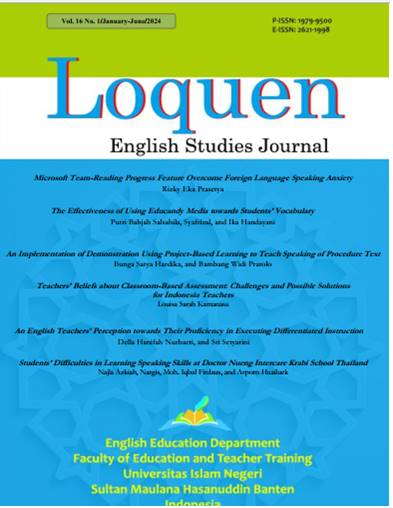Teachers’ Level of Autonomy: Freedom of EFL Teachers Perceived in Secondary Classroom
 DOI:
DOI:
https://doi.org/10.32678/loquen.v18i1.11815
 Abstract viewed : 67 times
|
Abstract viewed : 67 times
|  pdf downloaded : 49 times
pdf downloaded : 49 times
Keywords:
EFL Teachers, Level of Autonomy, Teacher Autonomy, Secondary ClassroomAbstract
This qualitative case study explores the teachers’ level of autonomy in seven areas of teaching, namely instructional materials, course content, teaching methodology, assessment, classroom management, lesson planning, and school curriculum. Five EFL secondary teachers in Serang participated in this study. Data were gathered through a questionnaire and semi-structured interviews and analyzed using content analysis. The finding revealed that the teachers perceived a high level of autonomy concerning course content, classroom management, and assessment. Regarding instructional materials, teaching methodology, lesson planning, and school curriculum, the teachers perceived a medium level of autonomy. However, they expressed a burden from the amount of authority they hold, due to a lack of guidelines, especially in lesson planning. The article concludes by considering several key implications for the government to provide sufficient training and to support teachers to learn with their peers through the existing teaching working groups available in their respective schools and regions.
Downloads
Downloads
Published
Issue
Section
License
Copyright (c) 2025 Intan Septia Latifa, Nenden Sri Lengkanawati, Ika Lestari Damayanti

This work is licensed under a Creative Commons Attribution-ShareAlike 4.0 International License.





















